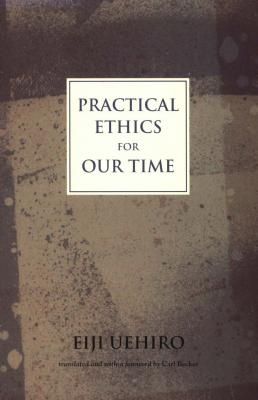Practical Ethics for Our Time. Eiji Uehiro
Читать онлайн.| Название | Practical Ethics for Our Time |
|---|---|
| Автор произведения | Eiji Uehiro |
| Жанр | Учебная литература |
| Серия | |
| Издательство | Учебная литература |
| Год выпуска | 0 |
| isbn | 9781462904808 |
Practical Ethics
for Our Time
Originally published in Japanese as
Rinri Jissen no Jidai.
Published by Charles E. Tuttle Publishing,
an imprint of Periplus Editions (HK) Ltd.
©1998 by Charles E. Tuttle Publishing Co., Inc.
All rights reserved
LCC Card No. 97-61393
ISBN: 978-1-4629-0480-8 (ebook)
First edition, 1998
Printed in Singapore
Distributed by:
| USA | Charles E. Tuttle Co., Inc. |
| 364 Innovation Drive | |
| North Clarendon, VT 05759-9436 | |
| tel: (802) 773-8930 | |
| fax: (802) 773-6993 | |
| Japan | Tuttle Publishing Japan |
| Yaekari Building 3rd Floor, 5-4-12 | |
| Tokyo 141-0032 | |
| tel: (81) (03) 5437 0171 | |
| fax: (81) (03) 5437 0755 | |
| Southeast Asia | |
| Berkeley Books Pte. Ltd. | |
| 61 Tai Seng Avenue, #02-12 | |
| Singapore 534167 | |
| tel: (65) 6280 1330 | |
| fax: (65) 6280 6290 |
Contents
| Foreword by Carl Becker | |
| Chapter 1 Dangers to the Natural Environment | 1 |
| Pollution of the Skies and Seas | |
| Depletion of Natural Resources | |
| Chapter 2 Questions of Modernization | 45 |
| Merits and Demerits of Technology | |
| The Limits of Individualism | |
| Chapter 3 The Failure of Economic Success | 83 |
| The Evil of Consumerism | |
| The Overvaluing of Money | |
| Chapter 4 The Confusion of Japanese Society | 129 |
| Poor Human Relationships | |
| Lost Family Ties | |
| The Degeneration of Education | |
| Chapter 5 A Future Built on Ethics | 197 |
Foreword
As the first atomic bomb detonated above him, Tetsuhiko Uehiro was in the men's room of a train station, one stop away from his appointed meeting place with a group of teenage workers. Feeling the shock and heat, he dove out the door, ducking and rolling away from the blast as he had learned in judo. Waves of thermonuclear fire rolled over him, searing his outer garments; radioactive dust rained on his head and shoulders.
Uehiro picked himself up and began walking through horrific fires and devastation toward the next train station. There he found only the charred cinders of a few of the teenagers who belonged to his work group. For the next four days he wandered through the radioactive rubble in his underwear, searching for anyone he knew, offering what little aid he could. Countless disfigured faces cried out for water and screamed in the pain of unrelievable burns; thousands more were burned and distorted into unimaginable shapes. After four days of searing these memories into his increasingly benumbed brain, Uehiro staggered ten miles more to his home outside Hiroshima and collapsed.
For six months thereafter, bedridden Uehiro fought for his life day and night against radiation sickness. His skin was scarred, his hair fell out, and his internal organs were ridden with radioactivity. Almost miraculously, he began to recover. But while bedridden, Uehiro was not idle. His mind was working continuously on a single problem: how to avoid future war and conflict. Today, we might call his experience posttraumatic stress. But instead of asking people's aid, this amazing man tried to think how he could solve the problem in the future. Inevitably, he returned to the same conclusion: as long as hate and conflict remain in people's minds, there will be no end to armed conflict.
How to eliminate hate and conflict from people's minds? This seemed a tall order. As he gradually recovered from his radiation sickness, Uehiro began walking across the country, networking with people, telling them what he had experienced, asking their help in leading more moral lives. Among those whom he met and conversed with were many who were inspired, even physically healed, by his burning devotion and commitment to the cause of moral living. An acquaintance in a rural part of Japan set up a group to study Uehiro's teachings and try to practice his principles. They rose early every morning, pledged themselves to avoid hate, envy, greed, and any kind of interpersonal disharmony, and spent time cleaning public places and doing minor public service works.
The movement spread. Fifty years later the Practical Ethics Association, born of Uehiro's search for a more practical and ethical lifestyle, is the largest nonreligious association in Japan, numbering nearly four million members. Every morning, in every part of the country, thousands of Japanese get up before the sun rises to join the association's Early Risers' Club. Committed to working personally and collectively for a more ethical society, they are comprised largely of housewives, but include businessmen, farmers, fishermen, students, retired persons, and others from all walks of life. In a country noted for its hierarchy, the association is notably egalitarian.
Its current president is Eiji Uehiro, the son of the late Tetsuhiko. Eiji also observed the tragedy of Hiroshima firsthand as a child, prayed for his father's recovery, and ultimately followed in his father's footsteps in building this huge nonprofit organization. The association now has its own assembly halls and offices, and holds significant influence in the Diet, where Eiji Uehiro himself is friends with the leaders of Japan's business and politics. The association publishes its own periodicals, and Eiji Uehiro has authored over a dozen books, of which this is one of the latest.
In
